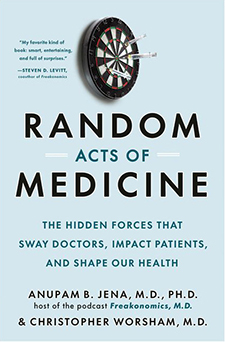Abraham Verghese; 2023, Grove Press UK
Explore This Issue
December 2023 Dr. Grey, director of the sinus center and vice chair of otolaryngology education at Massachusetts Eye and Ear in Boston, loved this author’s previous book Cutting for Stone, so she was eager to read his new novel.
Dr. Grey, director of the sinus center and vice chair of otolaryngology education at Massachusetts Eye and Ear in Boston, loved this author’s previous book Cutting for Stone, so she was eager to read his new novel.
Spanning the years 1900 to 1977, The Covenant of Water follows a family in southern India: A 12-year-old girl, grieving the death of her father, is sent by boat to her wedding, where she will meet her 40-year-old husband for the first time. The book follows the life span of the young girl and future matriarch through the changes, struggles, and joys of her extraordinary life. Filled with humor and deep emotion, The Covenant of Water was chosen as an Oprah Book Club selection for 2023.
What Dr. Grey wasn’t expecting was that the book centers on a family with vestibular schwannoma (VS).
Verghese is a physician, so most of his books are factually correct enough to be satisfying! — Stacy T. Grey, MD
“It was an enjoyable read,” she said. “I had no idea it was about VS; it unfolded in the story. It was presented as a mysterious condition that afflicted a family over several generations before a family member became a physician and identified the cause. Verghese is a physician, so most of his books are factually correct enough to be satisfying!”
Cristina Cabrera-Muffly, MD
Random Acts of Medicine: The Hidden Forces That Sway Doctors, Impact Patients, and Shape Our Health
Anupam B. Jena, MD, PhD, and Christopher Worsham, MD; 2023, Doubleday
 How much do timing, circumstance, and luck impact healthcare? According to the authors, events like these can have a profound effect.
How much do timing, circumstance, and luck impact healthcare? According to the authors, events like these can have a profound effect.
Random Acts of Medicine uses ingenious natural experiments—random events that unknowingly turn people into experimental subjects—to answer health questions such as, “Is there ever a good time to have a heart attack?” and “Why do kids born in the summer get diagnosed more often with ADHD?”
I also loved the part where it recommended seeing an older surgeon (their technical skills get better with age) but a younger primary care physician (they have a more current knowledge base). — Cristina Cabrera-Muffly, MD
“The data for natural experiments are very convincing,” said Dr. Cabrera-Muffly, who is the residency program director at the University of Colorado Anschutz in Aurora. “For example, for the ADHD question, the authors noticed that most well child visits are done the month of a child’s birthday. There’s a big difference between a child born in September who’s 5 when they start kindergarten compared to one whose birthday is in November who’s 5 and 10 months when they start kindergarten. Kids with summer birthdays are a lot younger than their peers and, therefore, have more trouble concentrating. I also loved the part where it recommended seeing an older surgeon (their technical skills get better with age) but a younger primary care physician (they have a more current knowledge base).”
Lisa Ishii, MD
Hidden Potential: The Science of Achieving Greater Things